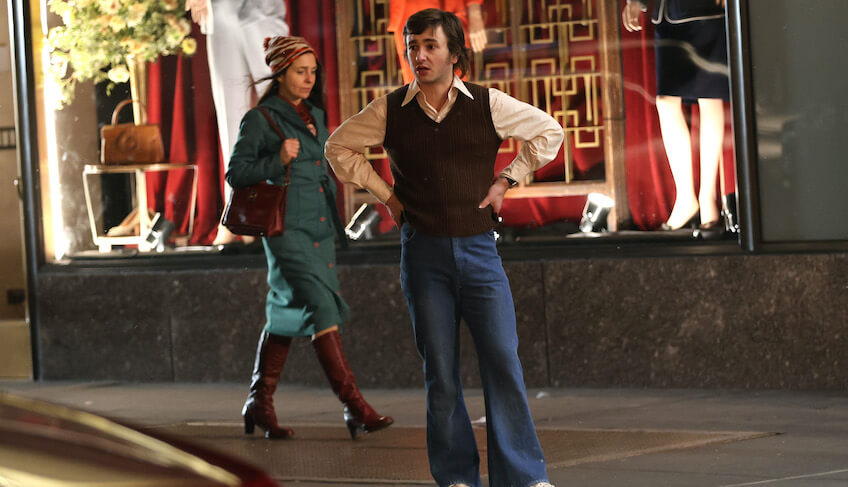My World Of Flops: Saturday Night
Saturday Night gave SNL fans just what they were all clamoring for: A worshipful biopic of bossman Lorne Michaels.
Photo: Jose Perez/Bauer-Griffin/GC Images (Getty)
My World Of Flops is Nathan Rabin’s survey of books, television shows, musical releases, or other forms of entertainment that were financial flops, critical failures, or lack a substantial cult following.
Jason Reitman was born into privilege and power. His daddy, Ivan Reitman, directed Ghostbusters. He consequently was a god among men. Can you imagine how cool everybody would think you were if your daddy directed Ghostbusters? The other kids would reek of jealousy if they thought Bill Murray might show up at your birthday party. You could get to know Slimer as a real phantasm, with real feelings and a complex interior life, not just a movie character.
Jason started to reap the rewards of his daddy directing Ghostbusters before he was Bar Mitzvah age. He had bit parts in 1988’s Twins, 1989’s Ghostbusters II, 1990’s Kindergarten Cop, and 1997’s Father’s Day. Did Jason Reitman’s daddy directing those films play a role in him getting roles? I don’t want to be cynical, but it probably did. But he ultimately did not want to act. He didn’t want a career in front of the camera. He wanted to direct, write, and produce. And he got a chance to direct at a precocious age, helming the well-received 2005 ad world satire Thank You For Smoking while still in his late twenties. Homeskillet had not yet reached 30 when he directed what proved to be his breakout film, 2007’s Oscar-festooned Juno.
When Juno made Reitman a major director, and not just someone whose daddy directed Ghostbusters, he was around the same age his daddy was when he made the leap from Canuck producer of underground sensations like the early David Cronenberg directorial effort Shivers to mainstream superstar producer of the Saturday Night Live-derived 1978 smash Animal House. That next year, Jason’s daddy pivoted to director of another Saturday Night Live-connected hit, 1979’s Meatballs, before going on to direct 1981’s Stripes and 1984’s Ghostbusters. The elder and younger Reitmans were both around 30 when they made their big, iconic breakthroughs. Lorne Michaels was 30 when Saturday Night Live began its endless, epic, and occasionally funny existence. So it is unsurprising that Jason Reitman makes Lorne Michaels—the haughty, pragmatic patriarch of a wild and unruly brood of writers and performers—the focus and hero of Saturday Night, rather than the people in front of the camera who actually made America laugh.
Saturday Night is pro-boss propaganda from someone who understandably identified more with the preternaturally capable and resourceful Boy Wonder behind the scenes than wildman John Belushi or violently verbose Prince of Darkness Michael O’Donoghue. When Saturday Night was released, its nearly superhuman hero had gone from being a young upstart to the embodiment of the comedy establishment. He has 21 Emmys and 106 nominations. He’s the most nominated figure in Emmy history. You do not earn that distinction without the mainstream aggressively approving of your life’s work.
Reitman first made his name as the sure-handed director of glibly clever comedies, but over the past half decade, Reitman has also embraced the mainstream, leaning all the way into being the guy whose daddy directed Ghostbusters. After an evil brigade of Satanic witches tried to steal the franchise away from the loyal, hardworking, patriotic, not at all sexist, thin-skinned, or immature fans with 2016’s Ghostbusters, Reitman triumphantly returned the series to its fans with 2021’s Ghostbusters: Afterlife. The legacy sequel gave audiences what they desperately craved: Bill Murray putting on the old costume and sleepwalking through a supporting role in exchange for an obscene payday. Ghostbusters: Afterlife and its Reitman-written 2024 follow-up Ghostbusters: Frozen Empire treated the movies Jason’s daddy directed like sacred texts.
The same is true, unfortunately, of 2024’s Saturday Night, a frenetic account of the 90 or so minutes leading up to the debut of what was then called Saturday Night but that would rise to fame as Saturday Night Live. Reitman depicts the first episode of Saturday Night Live as better and more important than all of Shakespeare’s plays combined.
While the rest of the world agrees that Saturday Night Live’s early years have been mythologized to such an extent that they can’t possibly live up to the hype, Reitman feels strongly otherwise. The second-generation director thinks we haven’t given Lorne Michaels, the staggering genius behind this most triumphant of wonders, enough credit. Saturday Night celebrates Lorne Michaels as an Irving Thalberg/Jason Reitman/Ivan Reitman-style genius who made the impossible happen for the stakeholders of the corporations he worked for.
Saturday Night argues unpersuasively that the universe can usefully be divided into two periods: pre-Saturday Night and post-Saturday Night Live. It doesn’t just see Michaels’ brainchild as something that defined a generation. Instead the film positions Saturday Night Live as a landmark that defined all of civilization.



















![HBO teases new Euphoria, Larry David, and much more in 2026 sizzle reel [Updated]](https://img.pastemagazine.com/wp-content/avuploads/2025/12/12100344/MixCollage-12-Dec-2025-09-56-AM-9137.jpg)




















